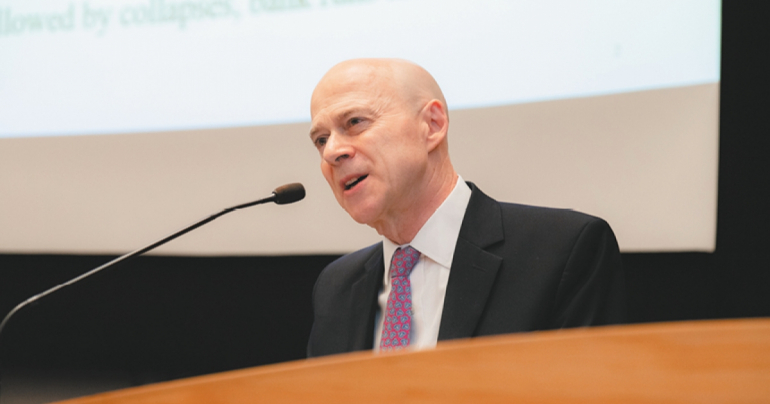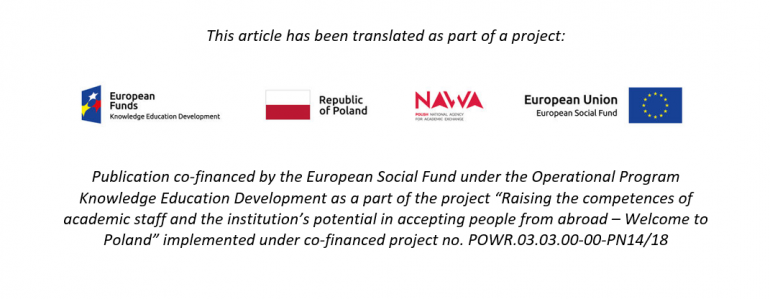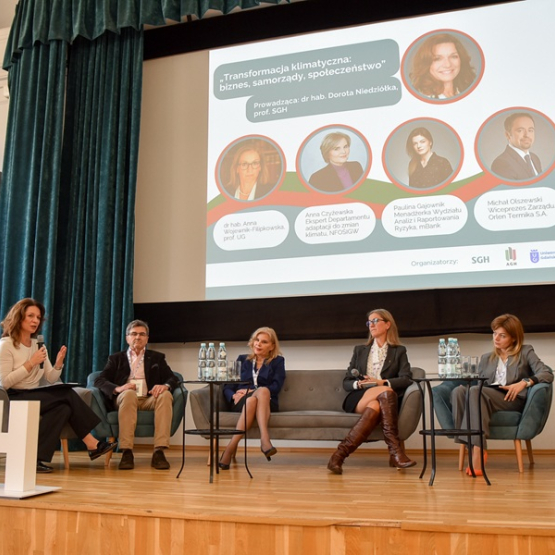
EDWARD ALTMAN LECTURE SERIES I WARSAW CONFERENCE IN FINANCE.
Edward Altman Lecture Series conference combined with the second edition of the Warsaw Conference in Finance took place at SGH Warsaw School of Economics for the fourth time. This event, organised on May 10, 2019, was financed by NBP under economic education programme. The media patrons were the following portals: StockWatch and aleBank.
The conference was officially opened by prof. Jacek Prokop, the Vice-Rector of SGH Warsaw School of Economics. Then prof. Małgorzata Iwanicz-Drozdowska, the chairwoman of the conference Scientific Council, presented the achievements of prof. Franklin Allen (Imperial College), the guest of honour at this year's event. The main point of the conference was the lecture conducted by prof. Allen on Asset price booms and bust and policies to counter them. The lecture aimed at presenting the issue of speculative bubbles identification and ways to combat them. The first part of the lecture dealt with international experience in the field of speculative bubbles. In this part of the lecture, Prof. F. Allen compared the development of real estate prices in different countries and presented practical conclusions as to possible identification of speculative bubbles in the future. The second part of the lecture illustrated the results of the study on the effectiveness of reducing speculative bubbles through the use of monetary and macro-prudential policy tools. In this context, prof. Allen stressed that all actions of both policies aiming at combating speculative bubbles ought to be undertaken with great caution and require consideration of a number of factors, inter alia, the degree of economy openness. Dr Piotr Bańbuła (NBP/SGH), a co-rapporteur, presented practical aspects of macro-prudential supervision in combating speculative bubbles. He also pointed to the significant importance of monetary and macro-prudential policy links in practices of the central banking. After the lecture, the Conference participants put questions to prof. Allen regarding the effectiveness of macro-prudential instruments (especially the LTV instrument - the ratio of loan value to collateral value) and the legitimacy of various policies in countering speculative bubbles. While answering the questions, prof. Allen referred to the experience of the USA and the European countries and at the same time confirmed the conclusions formulated by the results of his own research.
Then, six sessions devoted to various financial issues took place. As part of the ‘Financial Institutions’ session chaired by dr Dorota Skala (US), an analysis of the relationship between the shareholding structure and the transmission of international shocks was presented. The research covered banks from 59 countries, including their direct and ultimate shareholders. Next, the research on the use of social media by cooperative banks in Poland was presented. The team of authors analysed the intensity of using social media in the context of financial results of banks and local market competition. The last presentation included the study results concerning the determinants of obtaining excessive funding in the crowdfunding process in Poland.
During the session on ‘Supervision and macro-prudential policy’ run by dr Paweł Smag (SGH) the issues of macro-prudential policy were continued. The joint topic of the presentation during the session was the involvement of central banks in macro-prudential policy and its determinants. The role of independence and legal restrictions as some of numerous factors shaping the institutional model of macro-prudential supervision were highlighted. It has been argued that the role of interaction between macro-prudential and monetary policy goals is increasing, which complicates the central bank's decision-making process. It has been indicated that it is important to continue research in this area because ‘practice is ahead of theory.’
The ‘Innovations in finance’ session chaired by dr Grzegorz Sobiecki (SGH) was a panel discussion in character preceded by the speeches of three invited guests. They illustrated the impact of fintechs, neobanks and bigtechs on the development of digital economy, stressing that banks are still more trusted than fintechs because they are a regulated sector. In addition, the importance of blockchain and robo-advisors was analysed. New technologies require adaptation from existing players as well as customers.
As part of the ‘Payment systems and the market of payments’ session conducted by prof. Janina Harasim (UE Katowice), the payment costs in Poland and other EU countries were discussed and not high costs of banking payment services in Poland were underlined. The next issue was the interchange fee, for which five transmission channels of its reduction were identified. The last speech was devoted to payment exclusion in rural areas in Poland, or more precisely, the identification of ‘white spots’ in the acceptance network in the aforementioned areas. They were mainly villages with an average population.
Attending Edward Altman Lecture Series meetings provides a rare opportunity to discuss practical problems with a group of prominent and experienced economists.
The session on ‘Public Finances’ was run by professor Jolanta Szołno-Koguc (UMCS).The discussion revolved around the following issues: a measure of fiscal performance based on the ratio of tax revenues to space (the so-called tax density); comparison of incentives to taking up self-employment resulting from the Polish system of fiscal burdens against the background of solutions used in other EU countries; the latest legal and tax solutions (Innovation Box exemption), as well as the scale and structure of support of certain areas of intervention provided by the Polish tax system, such as: tax expenditures, against the background of such solutions exploited in other countries, including the USA, Canada and Australia.
The beginning of the ‘Corporate Finance and Bankruptcy Prediction’ session, moderated by prof. Marek Gruszczyński (SGH), included the presentation of research results regarding the relationship between the appointments of the presidents of stock exchange companies in Poland in the years 2001–2013 (and there were as many as 1015 of them) and the results of the indicated companies. Then the new author's credit quality assessment system for enterprises not financed in Poland was discussed as well as the analysis results concerning more than 32,000 companies from 43 European countries with final owners in 105 countries. It was shown, among others, that the national owner is inclined to take less risk than the foreign owner.
This year's conference was attended by researchers from numerous Polish universities as well as doctoral students and students from SGH and other academic centres. The next edition of Altman's lectures, combined with a scientific conference, is planned for April 2020. The main theme will be the capital market. Details will be available soon on the conference website (www.sgh.waw.pl/altman-lectures/).
You are welcome!
The text was edited on behalf of organisers of the conference and parallel sessions at SGH Institute of Finance.
Prof. Edward Altman is a retired finance professor at Stern School of Business, New York University. He is the Director of Research in Credit and Debt Markets in NYU Salomon Centre for the Study of Financial Institutions. He specialises in risk management. He is the creator of the globally recognised and widely used model for forecasting bankruptcy of Z-Score enterprises. Edward Altman conducts research in the field of bankruptcy analysis and bankruptcy prediction, ‘junk’ bonds, credit markets and credit risk analysis. In 2005, the professor was included in the group of 100 most influential people in the world of finance by the magazine ‘Treasury & Risk Management’. In 2015, Edward Altman received an honorary doctorate from SGH Warsaw School of Economics.
A detailed conference programme and a book of abstracts are available on the conference website http://www.sgh.waw.pl/altman-lectures.
The Project was implemented in cooperation with the National Bank of Poland as part of the economic education programme.




